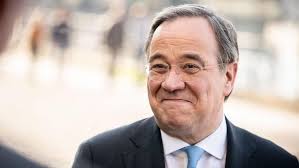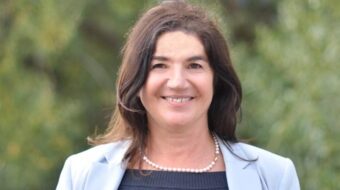
Armin Laschet, who won the Union bloc’s nomination after a series of fractious inner-party battles, has received particularly unfavorable reviews recently after a series of slips on the campaign trail in recent months. Polls this week put the center-left Social Democrats ahead — helped by the relative popularity of their candidate, Finance Minister Olaf Scholz, who is also vice chancellor in Merkel’s coalition government.
Speaking at the Berlin headquarters of his Christian Democratic Union party, Laschet said he wants his new team to reflect the Christian-social, liberal and conservative wings of the party. Several of the experts are familiar faces, including former rival Friedrich Merz, who was tapped to advise Laschet on finance and business matters.
Others, like extremism researcher Peter R. Neumann and music industry manager Joe Chialo, haven’t previously figured prominently in the party. Half of the team’s members are women. Germany’s parliamentary election takes place on Sept. 26. Merkel, who led the Union to four election victories, said in 2018 that she would not seek another term.
A survey released by public broadcaster ARD showed the Union bloc receiving 20% of the vote compared to 25% support for the center-left Social Democrats and 16% for the environmentalist Greens. The poll of 1,337 eligible voters conducted Aug. 30-Sept. 1 had a margin of error of two to three percentage points.
Laschet sought with Friday’s announcement to put pressure on Scholz, who has been largely responsible for the Social Democrats’ recent recovery after a long poll slump. Scholz’s party was notorious for infighting in recent years but has shown new discipline in recent months.
“Above all, I’m looking forward in the next days to seeing what other personalities the Social Democrats have to show, what the Social Democrats’ future team looks like, if you give them your vote,” Laschet said. “A lot of people are being hidden at the moment.”
That was a reference to the Social Democrats’ left-leaning party leaders, whom members chose over the pragmatic Scholz in 2019, and other figures on the party’s left. As its poll ratings have declined, the Union bloc has issued increasingly frequent warnings that Scholz would form a government with the hard-left opposition Left Party. Scholz has refused to rule out that option, but it also doesn’t appear very likely.
Parties don’t necessarily have to finish first in German elections to win the chancellery, since much depends on what coalitions they can form in the weeks and months afterward — but it certainly helps. And a senior Laschet ally insisted that the Union must set its sights on regaining the lead.
“We absolutely must not be content with second place, because second place ultimately means opposition and first place means an option to govern,» said Bavarian governor Markus Soeder, who battled Laschet for the Union’s nomination to run for chancellor earlier this year and has often sounded impatient with the bloc’s campaign.
Soeder dismissed the idea of the Union serving as a junior coalition partner in a future government. “If the Union is not No. 1 and by some distance, then there will be a left-wing government — whether it’s a very left-wing one or a diluted left-wing coalition,” he said.



